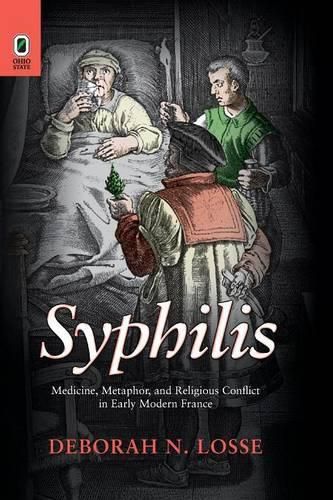Readings Newsletter
Become a Readings Member to make your shopping experience even easier.
Sign in or sign up for free!
You’re not far away from qualifying for FREE standard shipping within Australia
You’ve qualified for FREE standard shipping within Australia
The cart is loading…






This title is printed to order. This book may have been self-published. If so, we cannot guarantee the quality of the content. In the main most books will have gone through the editing process however some may not. We therefore suggest that you be aware of this before ordering this book. If in doubt check either the author or publisher’s details as we are unable to accept any returns unless they are faulty. Please contact us if you have any questions.
In Syphilis: Medicine, Metaphor, and Religious Conflict in Early Modern France, Deborah Losse examines how images of syphilis became central to Renaissance writing and reflected more than just the rapid spread of this new and poorly understood disease. Losse argues that early modern writers also connected syphilis with the wars of religion in sixteenth-century France. These writers, from reform-minded humanists to Protestant poets and Catholic polemicists, entered the debate from all sides by appropriating the disease as a metaphor for weakening French social institutions. Catholics and Protestants alike leveled the charge of paillardise (lechery) at one another. Losse demonstrates how they adopted the language of disease to attack each other’s politics, connecting diseased bodies with diseased doctrine.
Losse provides close readings of a range of genres, moving between polemical poetry, satirical narratives, dialogical colloquies, travel literature, and the personal essay. With chapters featuring Erasmus, Rabelais, Montaigne, Lery, and Agrippa d'Aubigne, this study compares literary descriptions of syphilis with medical descriptions. In the first full-length study of Renaissance writers’ engagement with syphilis, Deborah Losse charts a history from the most vehement rhetoric of the pox to a tenuous resolution of France’s conflicts, when both sides called for a return to order.
$9.00 standard shipping within Australia
FREE standard shipping within Australia for orders over $100.00
Express & International shipping calculated at checkout
This title is printed to order. This book may have been self-published. If so, we cannot guarantee the quality of the content. In the main most books will have gone through the editing process however some may not. We therefore suggest that you be aware of this before ordering this book. If in doubt check either the author or publisher’s details as we are unable to accept any returns unless they are faulty. Please contact us if you have any questions.
In Syphilis: Medicine, Metaphor, and Religious Conflict in Early Modern France, Deborah Losse examines how images of syphilis became central to Renaissance writing and reflected more than just the rapid spread of this new and poorly understood disease. Losse argues that early modern writers also connected syphilis with the wars of religion in sixteenth-century France. These writers, from reform-minded humanists to Protestant poets and Catholic polemicists, entered the debate from all sides by appropriating the disease as a metaphor for weakening French social institutions. Catholics and Protestants alike leveled the charge of paillardise (lechery) at one another. Losse demonstrates how they adopted the language of disease to attack each other’s politics, connecting diseased bodies with diseased doctrine.
Losse provides close readings of a range of genres, moving between polemical poetry, satirical narratives, dialogical colloquies, travel literature, and the personal essay. With chapters featuring Erasmus, Rabelais, Montaigne, Lery, and Agrippa d'Aubigne, this study compares literary descriptions of syphilis with medical descriptions. In the first full-length study of Renaissance writers’ engagement with syphilis, Deborah Losse charts a history from the most vehement rhetoric of the pox to a tenuous resolution of France’s conflicts, when both sides called for a return to order.